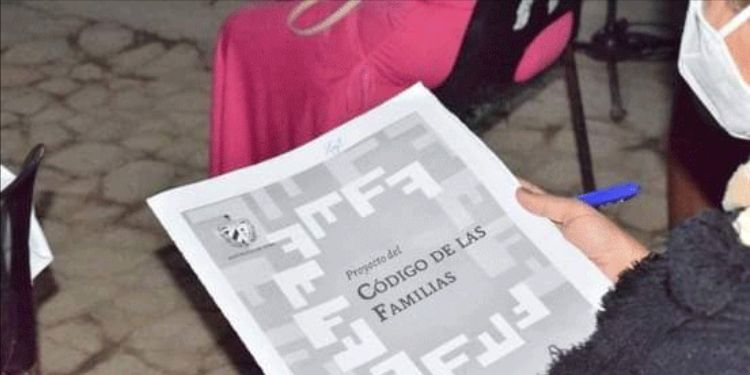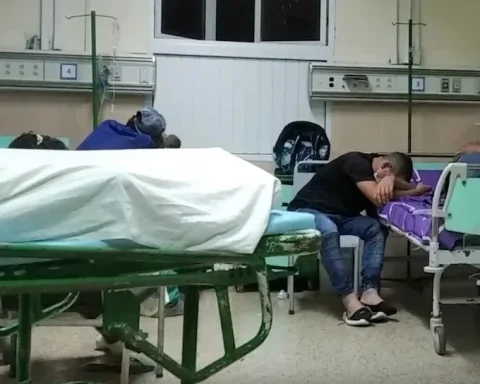Havana Cuba. — Last Friday, the National Assembly of People’s Power of Cuba approved Version 25 of the Family Code. This final variant does not present great differences with the previous one, which was submitted to discussion by the citizens. It was also agreed to submit the text to a referendum in Cuba on September 25, and for government supporters living abroad, a week before.
As expected, Castro’s propaganda has been undone in praise of the new legal body. According to the official text published in Granma, the designated president, Miguel Díaz-Canel, in the first part of his final speech before the Assembly, went so far as to describe it as “a great bedside book that our educators should have at hand”; also “as a reference text for the civic education of women and men of tomorrow.”
Making a final characterization of this new law of Castroism, the also First Secretary of the only legal party, to the applause of the disciplined legislators, proclaimed: “It is a code of love, a code of peace!” And he ended that part of his speech on a sentimental note: “I feel moved and proud to summon our people to say Yes for the Family Code!”
In another passage of his speech, Díaz-Canel also stated: “With the popular consultation we have all won.” And he mentions in the first place the “people”, of which he affirms that he has been a “direct participant” in the writing. However, it is inescapable to verify that, of the 25 versions that the new law has had, that mass that is now given the solemn title of “Sovereign” has only known a couple. And the other 23 what! Over the years, the new stew was cooked clandestinely, among communists, in the exclusive kitchens of Castroism.
What can we say to that same people about the work carried out by the jurists who in one way or another participated in that cooking? It is necessary to recognize that, in the text published and now approved, those colleagues of whom this writes show that they have studied exhaustively comparative legislation on Family Law.
The evidence of this exhaustive study carried out by the jurists of Castroism forces us to ask ourselves: Were these specialists unaware of the provisions of the third section of article 26 of the Constitution? Universal Declaration of Human Rights! There it is proclaimed: “3. Parents shall have a prior right to choose the type of education to be given to their children.
However, this last aspect, which is vital, is conspicuous by its absence in the more than half a thousand articles of the brand new Family Code. This includes the issue of religious instruction, which is fundamental for most believers, who do not agree with the “scientific atheism” of Marxism-Leninism.
The inescapable conclusion of all the above is one, and it is outrageous: if the preferential right of parents to determine what kind of education their children will receive is ignored, this is due not to ignorance, but to the deliberate intention of the communists to maintain absolute control over this fundamental facet of the formation of the new generations.
In my opinion, the latter is the fundamental defect of the new text. Added to the foregoing is the abrogation of the term “patria potestas”. To eliminate it, linguistic arguments are mendaciously invoked. It is stated that, supposedly, the most appropriate concept in contemporary law is that of “parental responsibility”, something that is still curious under a regime that, in the sixties, accused of being slanderers those who affirmed that “the Revolution” wanted to abrogate parental authority.
To these intrinsic deficiencies of the document, very serious in themselves, are added those that will surely derive from the practical application of its precepts. It is intended to project an image: that the Family Code It will serve to protect all the homeless. That the judges of the regime will always make justice shine.
They want unsuspecting citizens to forget that these officials belong to the same group as those who, responding to government slogans, sentence citizens to decades in prison who took to the streets just over a year ago to proclaim their lack of fear, demand freedom and express their repudiation of the president “handpicked”.
If Cubans can trust in something, it is that, when politics (or, to speak more properly, the filthy Castroist politicking) is introduced in a family dispute, when it is necessary to choose between an “integrated partner” and a “disaffected to the system” (“a worm”), it will not take too much imagination to know which way the balance will tip.
But beyond the anti-popular nature of the Code’s articles and the predictable arbitrariness of the biased communist judges, the referendum convened for the coming September 25 provides a golden opportunity for the people to pronounce on the inept government that has been forced to endure for decades. Specifically, what can anticommunist voters do on September 25? Refrain from going to vote, cancel the ballot or vote for the “no”?
Withdrawal seems inappropriate for several reasons. In the first place, because that option is more difficult for the clear majority of voters who, although they repudiate the prevailing system, do not want to “stand out”. It is that the regime urges people to vote, and the opposite attitude —which can be easily verified— implies assuming an attitude that differs from the one “oriented” by the government.
Secondly, because, strictly speaking, acting in this way does not reveal a position clearly opposed to that advocated by the regime. Those who stop going to vote will be confused, in the figures, with those who are sick, the indolent wishing to save themselves the trouble and some religious fundamentalists. In short, they will not be voting in favor of the government proposal, but they will not be voting against it either.
Thirdly, because at the international level this massive abstentionism would not be perceived as a sign of rejection of the regime. Unfortunately, in democratic countries —such as the United States or those of Europe— it is not uncommon for a minority of eligible citizens to vote. If something similar were to happen in Cuba, international public opinion would identify that situation with which they sometimes experience in their own countries (which has to do with indifference to the election result, and not with rejection of the prevailing government) .
Some supporters of the withdrawal express that in this way Castroism is prevented from reducing the numbers of those who vote for “no” and artificially increasing the affirmative votes. This argument is untenable. Do they think that it is more difficult for the regime to increase the support for the “yes” by inflating the number of those who supposedly went to vote! In fact, the latter is easier, since it is enough to fill out affirmative ballots; there is also no need to destroy those marked with “no”!
For those who go to vote, I don’t see much point in canceling the ballot or leaving it blank. This would not express a clear opposition to Castroism. In addition, it would clear the way for a minority of voters to impose the approval of the antipopular Family Code.
That leaves, as the advisable option, that of going to vote and doing it for the “no”. This would reflect a clear position against the aforementioned law and the prevailing government that proposes it. I am not unaware that there is a danger: that the electoral authorities, at the national, provincial or even local level, adulterate the true results of the process.
The risk is real, but the political cost, within their own ranks, would be very high for the Castroists. Those who participate in the scrutiny will know the adulterations perpetrated. The true results would always be known by the leadership, and this, although some think otherwise, is not monolithic. Embedded within it are anonymous supporters of initiating the changes the country desperately needs.
A considerable number of votes for “no” would allow Cuba, as has happened in the dozens of Eurasian countries that have happily freed themselves from communism, to initiate these essential changes within the same single party. Let us propitiate with our votes that this happens, for the good of our Homeland!
OPINION ARTICLE
The opinions expressed in this article are the sole responsibility of the issuer and do not necessarily represent the opinion of CubaNet.
Receive information from CubaNet on your cell phone through WhatsApp. Send us a message with the word “CUBA” on the phone +1 (786) 316-2072, You can also subscribe to our electronic newsletter by giving click here.

















